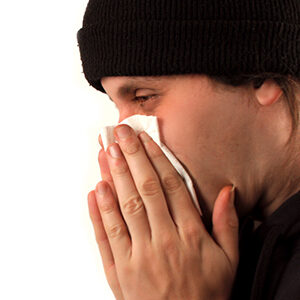
Flu Season in Spokane Isn’t Over Yet
For more information, contact Kim Papich, SRHD Public Information Officer (509) 324-1539 or kpapich@srhd.org
Second wave hitting county, surge of influenza B could still be on its way; officials recommend flu shot for unvaccinated
SPOKANE, Wash. – Although the flu season should be coming to an end, Spokane Regional Health District (SRHD) officials warn that in recent weeks, a second wave of influenza is hitting Spokane County.
Officials noted that after a peak in January, influenza hospitalizations declined in February, which is typical for the region. This was followed by an unexpected increase in hospitalizations in March. Increases represent both A- and B-strains of the virus, yet numbers for the B-strain are significantly higher than previous seasons.
There were 63 influenza B hospitalizations in March 2018 compared with six influenza B hospitalizations in March 2017. Cases of influenza B represent a higher proportion of the total flu hospitalizations in March this year, at 72 percent compared with last year’s 27 percent. This is likely unrelated to a typical increase of influenza B in late spring, leading officials to warn that a wave of influenza B could still be forthcoming.
“We often see a late surge of influenza B during seasons when influenza A H3N2 was the predominant virus earlier in the season,” said Dr. Bob Lutz, SRHD health officer. “In the midst of already seeing higher than normal cases of influenza B, we also don't know what the influenza B wave will look like."
The virus strain can pose just as many health problems as the A-strain. Nearly half of all local flu deaths this season were caused by the B-strain.
"We know illness associated with influenza B can be just as severe as illness associated with influenza A," continued Dr. Lutz. “We also know influenza B tends to be more severe for younger children."
More than 20 hospitalizations for flu in Spokane County this season were among individuals between the ages of 0-20. In total, 571 individuals have been hospitalized in Spokane County with laboratory-confirmed flu, compared to 271 admissions during the same period last year.
Officials recommend unvaccinated people still get the flu vaccine. Sixty-seven percent of Spokane’s 37 flu deaths this season were in the unvaccinated. The vaccine provides high protection for the B-strain and can help flu illness be milder and shorter for those who still get sick.
In addition to flu vaccination to prevent illness, the health district also recommends frequent hand washing with warm water and soap, covering coughs and sneezes, and staying home if sick.
People who have the flu often feel some or all of these symptoms:
- Fever or chills
- Cough
- Sore throat
- Runny or stuffy nose
- Muscle or body aches
- Headaches
- Extreme fatigue (very tired)
If a person becomes ill, they should consult with a healthcare provider about diagnosis and possible treatment with antiviral drugs. While most people who become ill with flu can be safely cared for at home, some symptoms, like trouble breathing, should trigger immediate emergency care. Also, if an ill child has a fever for many days, if a fever goes away then comes back, if the child becomes less responsive, or if their lips become dusky, the child requires prompt evaluation. Symptoms could suggest complications, such as pneumonia or other sepsis.
Spokane Regional Health District also continues its recommendation that unvaccinated healthcare workers wear masks while at work. The health district will lift its masking recommendations when influenza positivity rates drop below 10 percent for two consecutive weeks.
For more information about influenza and influenza vaccine visit cdc.gov/flu or srhd.org. Spokane Regional Health District’s website also offers comprehensive, updated information about Spokane Regional Health District and its triumphs in making Spokane a safer and healthier community. Become a fan of SRHD on Facebook to receive local safety and wellness tips. People can also follow the health district on Twitter @spokanehealth.
